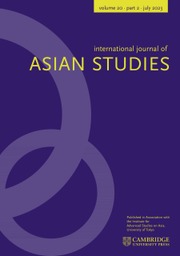Article contents
DECENTRALISED GOVERNANCE AS SITES FOR SELF-FORMATION: A COMPARISON OF PRACTICES OF WELFARE DISTRIBUTION IN TELANGANA, INDIA, AND CENTRAL LOMBOK, INDONESIA
Published online by Cambridge University Press: 08 July 2014
Abstract
Studies that examine the effects of decentralisation for social change or stasis have placed necessary attention on its institutional dynamics: the ways social institutions have transformed as a result of new governance regimes, or alternatively, how the existing institutional context and attendant power relations determine its actualisation. The second facet of the structure/agency dialectic is often overlooked however, that is, the actors themselves. This article seeks to overcome this lacuna by exploring the effects of citizens' engagement in practices associated with decentralised governance for individuals' understandings of self, society, and their relationship with the state. A comparison of two villages in Telangana, India, and Central Lombok, Indonesia reveals how differences in the distribution of welfare benefits have implications for the potential of such interactions to be sites of creative self-formation. Differences such as the regularity and ability to demand entitlements, preferential versus equal access to resources, and the levels at which citizens engage with the state, may be crucial for processes of subjectification, and by extension, social transformation.
Keywords
- Type
- Research Article
- Information
- Copyright
- Copyright © Cambridge University Press 2014
References
REFERENCES
- 4
- Cited by




